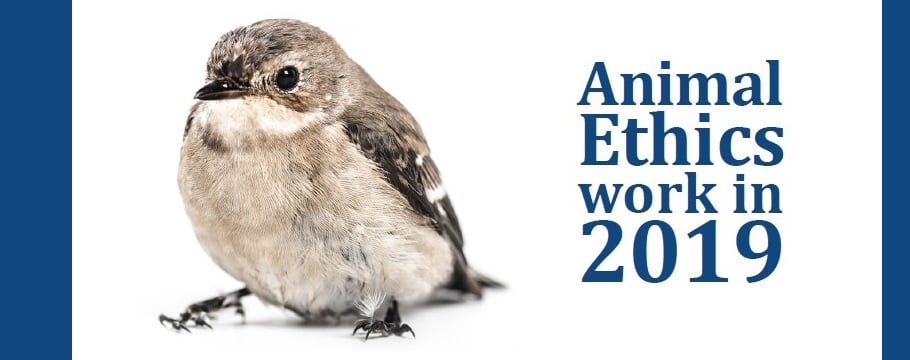Animal Ethics work in 2019
In 2019, at Animal Ethics we have been able to increase our work significantly, in quantity, scope, and potential impact. We have increased our focus on animals in the wild, by studying how to best promote work in this field in academia, promoting and carrying out welfare biology research, and doing capacity building work to increase the knowledge of animal advocates and effective altruists in wild animal suffering.
We have continued our work in other areas. We’ve expanded our activities internationally, by starting to work in India, initiating new activities in Brazil and researching how to best promote the defense of animals in China. We have done more work on the sentience of invertebrates. Finally, although our focus in 2019 has been mostly on research and capacity building, we continued our outreach work. The following is a summary of our work this year. You can click on the picture to see or download the report as a pdf file, or read it below.

A summary of our work: a year in activism
Research in wild animal welfare and welfare biology
We published the following research focused on the ways to study the suffering of animals in the wild:
- Urban welfare biology
- How age-specific mortality is relevant for welfare biology
- A bibliography of literature useful for welfare biology
We have been working on a study of the causes of harm to wild animals in Greece
In addition, the following research projects are currently underway through our work with university departments around the world. We funded two postdoc researchers for the following work:
- A study of the causes of harm to wild animals in Canada at the University of Guelph, Canada
- A study of the situation of wild animals in forest fires and how to help them at the Autonomous University of Madrid, Spain
We are also providing funding to the following research project by the Marine Research Group, based at Massey University, New Zealand: Establishing a framework to aid welfare-based decision-making for the benefit of stranded whales
Capacity building in work on wild animal suffering
We have updated and expanded our website content about wild animal suffering. The following pages were updated or created this year:
Introduction to wild animal suffering
The situation of animals in the wild:
- Malnutrition, hunger, and thirst
- Diseases in nature
- Physical injuries in wild animals
- Weather conditions and nonhuman animals
- Animals in natural disasters
- Intraspecific fights
- Interspecific conflict
- Sexual conflict
- Psychological stress in wild animals
Why wild animal suffering matters
- Population dynamics and animal suffering
- Evolutionary reasons why suffering prevails in nature
- Can animals in the wild be harmed in the same ways as domesticated animals and humans?
- Rescuing trapped animals
- Vaccinating and healing sick animals
- Helping animals in fires and natural disasters
- Caring for orphaned animals
- Providing for the basic needs of animals
- Working for a future with fewer harms
We are preparing audio versions of our wild animal suffering materials.
In addition to this, we are creating materials to provide information and guidance to animal advocates who want to make a difference for animals in the wild. They will include a guide about how to do work on wild animal suffering and an online video course presenting and expanding on the content of the guide. The course will include modules about wild animal suffering and how to help, animal ethics, and welfare biology.
Finally, we conducted two studies (one based on qualitative interviews and another one based on a survey) about scientists’ attitudes towards reducing wild animal suffering. The results are enlightening, and we will be publishing them in the next few months.
International expansion
Work in India
We have started to work in India. In January 2020, we will start a series of talks at Indian universities about speciesism and wild animal suffering.
Expanding our work in Brazil
We have continued our outreach work in Brazil, with a focus on reaching students. We hold activities regularly at the Federal University of Espirito Santo, and we organized and gave an officially recognized course at the Federal University of Santa Catarina.
Carrying out research about how to work in defense of animals in China
Last year, we launched the Chinese version of our website, and our leaflets are available in Chinese. In 2019, we continued our research about how to best do work in China.
Other work
Conferences and seminars
While in 2019 many of our efforts have been dedicated to research and capacity building, we have also continued to do outreach work. Animal Ethics members gave talks and seminars in numerous countries, including the UK, Sweden, Australia, New Zealand, Romania, Italy, and Spain. We gave presentations at two EAGx conferences, in Stockholm and Sydney. In addition to the course that we carried out in Brazil, one of our members gave an officially recognized short course about animal ethics at the University of Buenos Aires, in Argentina.
Online presence
Our website is currently available in 8 languages. In total, including the contents in all languages, it now has more than 1,300 posts and pages. In addition to the work mentioned above, we have published new content on other topics as well, including invertebrate sentience and the impact of fireworks on animals.
We are present on Twitter, Instagram, and Facebook, where our impact is the largest, with our Facebook pages in English, Spanish, and Portuguese having, combined, more than half a million followers.
Widely distributing our printed materials
Our printed materials are available in English, Spanish, Portuguese, German, Italian, French, and Chinese, and are distributed internationally.
This has happened thanks to your help
We want to thank all the people who have donated and volunteered with us as all the results we’ve had would have been impossible without your help.